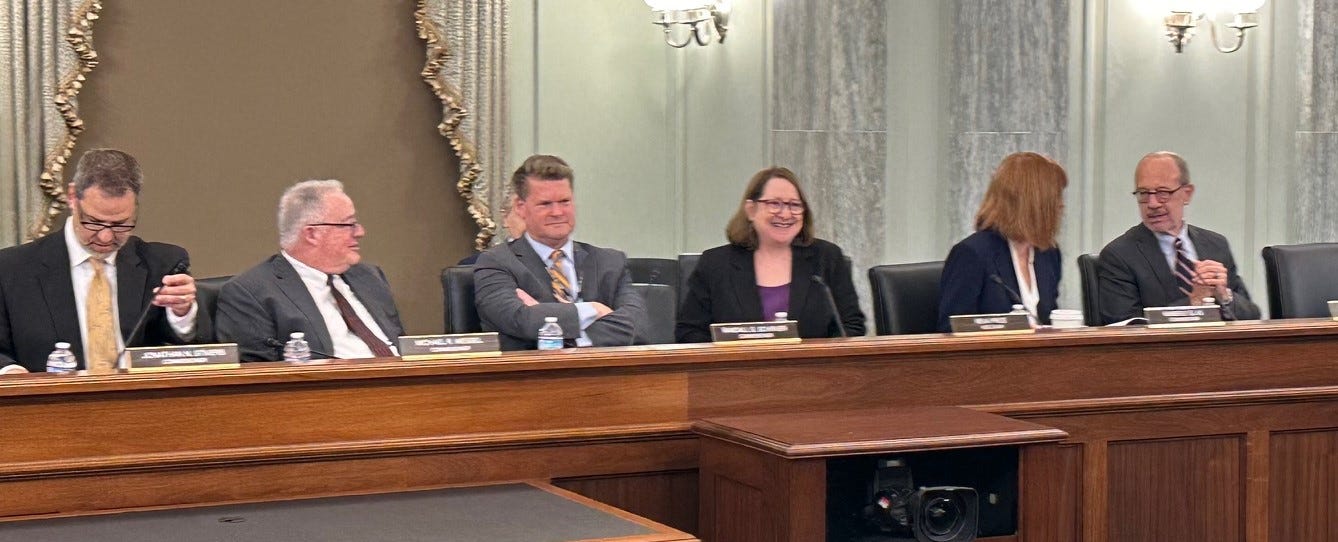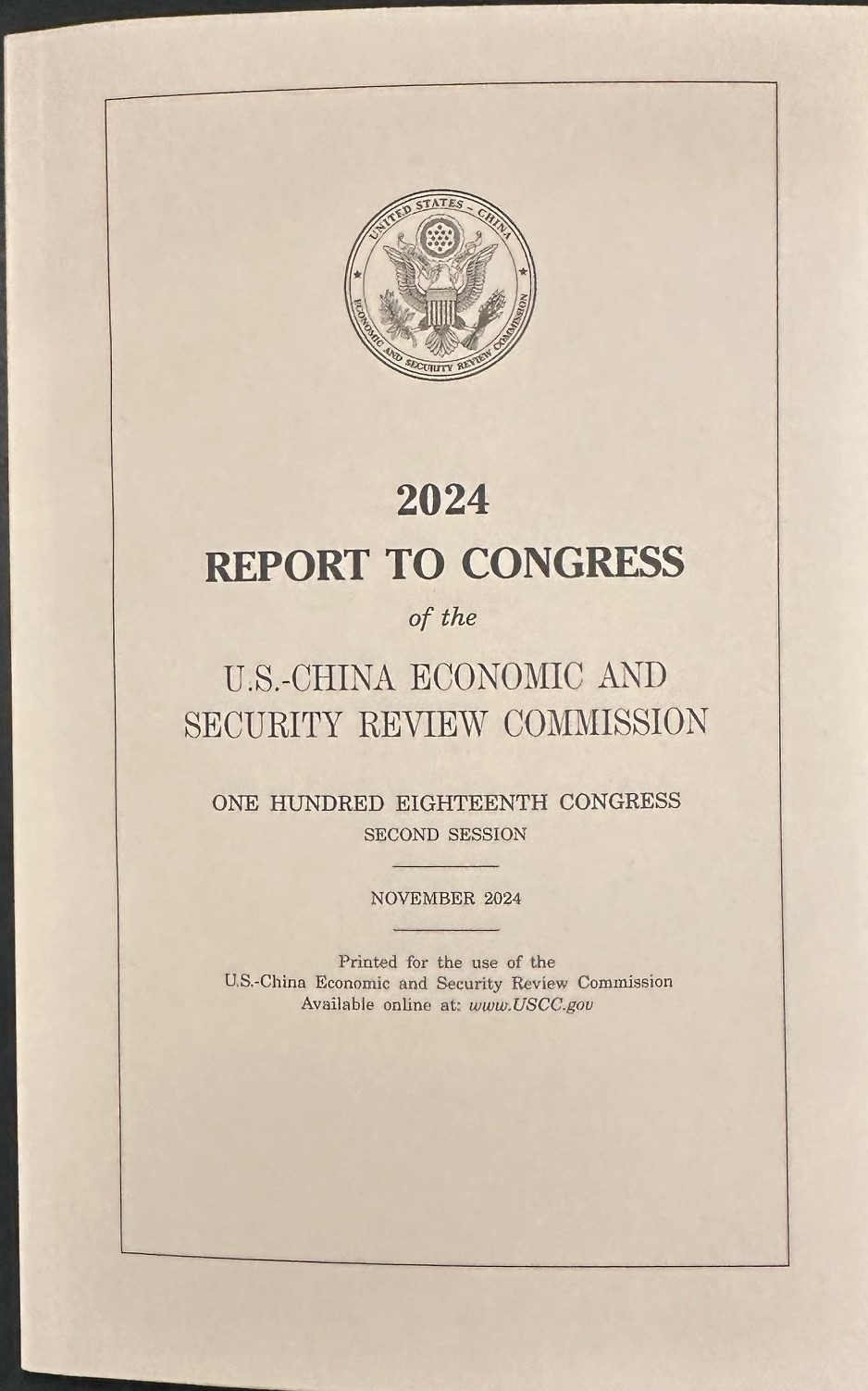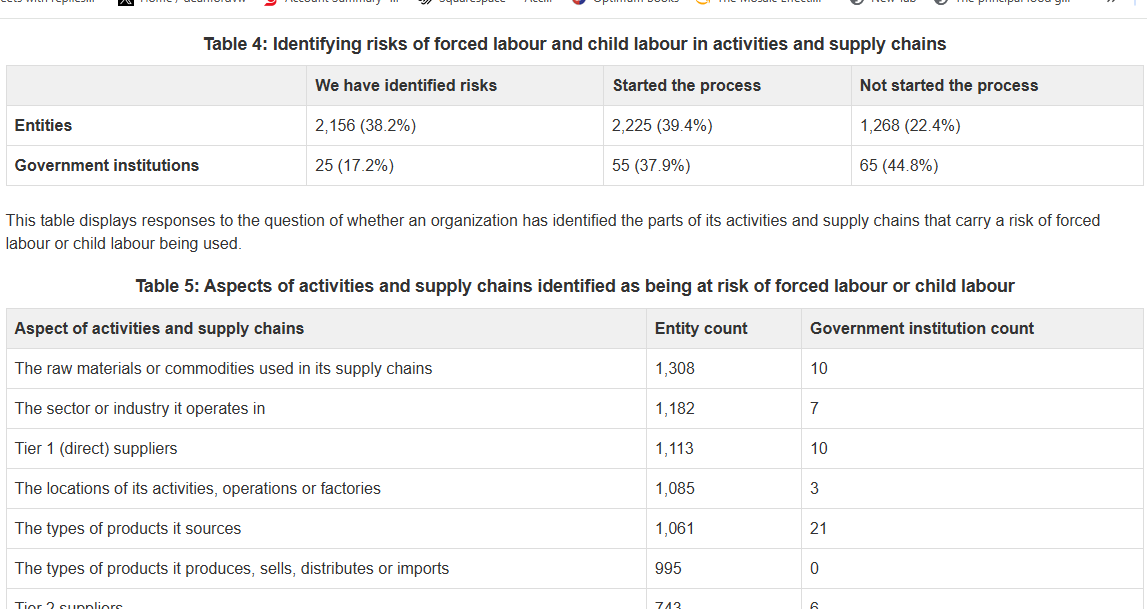US/China Economic Security and Review Commission
By Dean Baxendale
Washington, DC
The supply chain in today’s global economy has become a complex web, stretching across borders and relying on countless moving parts. Yet, it remains disturbingly easy for unsafe or unethical products to infiltrate this network. The just-released 2024 annual report from the U.S.-China Economic and Security Review Commission underscores this growing risk, especially from China. The report paints a grim picture of regulatory challenges, particularly with goods entering the U.S. through Canada and Mexico. It raises a crucial question: Are America’s closest trade allies doing enough to stem the tide of unsafe imports?

Today, the US/China Economic Security Commission submitted its report to Speaker Mike Johnson House and Senator Patty Murray. “It is the largest every report ever by the Commission, “said Jameson Cunningham, the Commission’s Congressional Affairs and Communications Director. There is so much to digest in the report, but what matters to Canada and Mexico should be how we will work with our American cousins to protect the supply chain from illicit, slave and dangerous goods from entering our markets and disadvantaging US and Canadian manufacturers. The Americans have a lot more work to do. Still, Canada needs to do its part to fight against child and slave labour while ensuring that goods manufacturers under US and international sanctions are not using us as a transnational hub to circumvent such measures.

In 2023, when MP John McKay worked with the Senate to pass the (S211) Fighting Against Forced Labour and Child Labour in Supply Chains Act (the “Supply Chains Act”) in May of 2023, it met some initial resistance within the Liberal caucus regarding the implementation of this voluntary compliance program for Canadian importers. Some wanted to kick the can down the road, but thanks to the tireless work of both Public Safety Minister LeBlanc and John McKay, they pushed hard and won the day. On December 20, 2023, Public Safety Canada released its new website (the “Website”). It was a comprehensive yet voluntary program but the results would confirm what we already knew. Canadian corporations had to file their first report by May 31, 2024. Canada has a slave labour products problem, as do all democracies (just ask Volkswagen). The issues surrounding slave labour are all-encompassing, but if China is to fulfill its promise, it needs to elevate the wages of all Chinese workers. We need a world where all play by the rules, as using slave labour affects Canada’s and Mexico’s competitiveness in the market for everyday consumer goods.
Many global trade advocates wanted China to compete the old-fashioned way….by following the rules and regulations. They have demonstrated they will not.
In Ontario, Premier Ford called on Mexico to be isolated from the USMCA this past weekend if it does not impose tariffs on EVs and other Chinese goods that circumvent sanctions and fair trade practices that disadvantage Canadian and American workers. This is dealt with extensively in this year’s report. President Donald Trump has publicly stated his position on the matter and will work to isolate Mexico during the 2026 USMCA review process if they continue down this path.
As all consumers know, e-commerce has revolutionized consumer behaviour by offering convenience and variety. However, it has also opened floodgates to products that evade traditional regulatory scrutiny. A loophole in U.S. customs law, the de minimis exemption, allows goods valued under $800 to enter the U.S. duty-free and largely unchecked. Many China-based sellers exploit this to ship counterfeit, unsafe, or substandard products directly to American homes.
The sheer volume of parcels—millions arriving daily—makes inspection nearly impossible. Batteries that explode, medical devices that fail, and toys that endanger children are not isolated incidents but symptoms of a broken system.
Canada and Mexico: Partners or Enablers?
Under the USMCA trade agreement, Canada and Mexico play pivotal roles in North America’s supply chain. Yet, these countries have become loopholes for Chinese goods entering the U.S. market. Chinese companies often establish operations in Mexico and Canada, using them as staging grounds to circumvent U.S. tariffs and scrutiny. Transshipment, mislabeling, and undervaluation are common tactics that allow hazardous products to slip through the cracks.
This is not just a U.S. problem. Canada and Mexico’s lax enforcement undermines U.S. efforts and exposes their consumers to risks. The report urges both countries to tighten their controls, from better inspection processes to harsher penalties for violations. Minister Mary Ng, who is responsible for International Trade here in Canada, reviewed the report, and then Dominic Leblanc, Minister of Public Safety, tabled the report in the House of Commons on September 27, 2025. It highlights that of the close to 6000 reporting entities, 38.2% identified risks, and another 39.4% had started the process, which suggests that the number of organizations with Slave labour components in their supply chain will easily top 50%.

The Human Cost: Slave Labor in the Supply Chain
Beyond safety concerns, many Chinese goods are tainted by forced labour, particularly from regions like Xinjiang. These practices raise moral and ethical red flags, with global consumers unwittingly complicit. While the U.S. has taken steps to ban such products, enforcement is patchy, and Canada and Mexico are accused of turning a blind eye, allowing these goods to filter through their markets.
Recommendations: A Unified Front
The 2024 report calls for bold actions by US lawmakers.
- Eliminating the de minimis exemption to close a critical loophole.
- Requiring full transparency from online marketplaces, including manufacturer details and country-of-origin labels.
- Developing advanced tools to trace the origins of components in imported goods.
- Conducting a comprehensive review of how Chinese investments in Canada and Mexico influence North American trade dynamics.
The Need for Accountability
The path forward is clear: Canada and Mexico must step up. This is not just about protecting U.S. interests; it’s about ensuring that all three nations uphold shared values of safety, ethics, and fair trade. Failing to act allows unethical practices to flourish and endangers millions of consumers.
This issue demands a coordinated response. The U.S., Canada, and Mexico must collaborate to enforce stricter regulations and eliminate vulnerabilities in the supply chain. Anything less would be willful blindness—a betrayal of the very citizens these governments are sworn to protect.
Our safety is only as strong as the weakest link in an interconnected world. Canada and Mexico must decide whether to be partners in securing the supply chain or enablers of a dangerous status quo.
With Donald Trump back in the White House and the administration’s stance towards a belligerent China that has seldomly complied with the WTO rules and regulations, the 2026 review of the USMCA should cause Canada’s Trade and Global Affairs departments a lot of sleepless nights.






